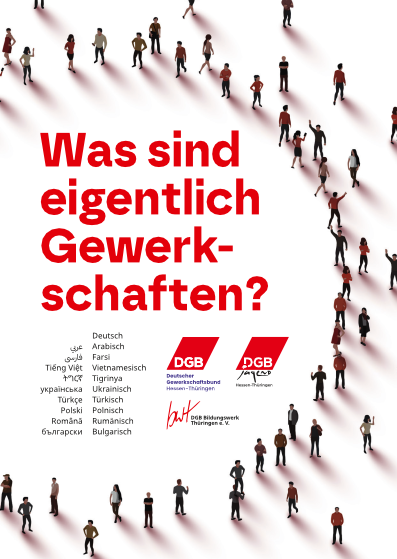What is a Trade Union?
Unions are associations of people who come together to improve the conditions under which they work and live. They exist for many different fields of work (you can find an overview on the following pages). The more members a union has, the better it can assert itself. Unions, along with their members, strive for better pay, adherence to workers‘ rights, and improved working conditions. One way to achieve this is through collective agreements: if a union has many members, it is strong enough to negotiate with employers, for example, for higher wages in its sector. Unions are independent of political parties and the state, but they represent political interests. Membership is voluntary. In Germany, union membership is protected by the constitution. This means you cannot be disadvantaged at work or in your free time because of your membership. Your membership is none of your employer’s business. The largest unions in Germany are grouped in the German Trade Union Confederation (DGB). Their youth organizations form the DGB Youth.
What Do Unions Stand For?
Good Work for All Employees
Good working conditions are important for a good life. Unions advocate for the improvement of working conditions to achieve financial security and individual development opportunities for all employees.
Participation
Unions support works councils and staff councils. The works council/staff council represents the employees in a company and is elected by all employees—regardless of their residence status. Works councils monitor the compliance with laws in the workplace, defend the interests of colleagues against the employer, and have co-determination rights in many matters, from shift plans to dismissals to equality.
Solidarity for All
Unions advocate for the equality of all employees because unequal treatment divides the workforce. Women and migrants often earn less and suffer from worse working conditions and discrimination. Therefore, unions demand, among other things, equal pay for equal work.
Creating a Just Society
Unions do not only fight for fair working conditions but also for a free and just life. For years, unions have been advocating for democratic participation to be possible not only in the workplace but also in politics for everyone. Therefore, they support the right to vote for all people with a main residence in Germany—regardless of nationality.
What Does Membership Bring You?
As a union member, you are part of a strong community with nearly 6 million members nationwide who stand by your side! With the union, you have:
- A strong voice to assert your interests
- Legal advice
- Legal protection for labor and social law
- Review of employment contracts and references
- Strike pay during labor disputes
- A wide range of educational opportunities
- And much more…
And What Does It Cost You?
On average, union membership costs 1% of your gross salary per month. For example, with a gross monthly salary of €1,850.00, you pay a contribution of €18.50. There are lower contributions for students, pensioners, and people without income.
What Have Unions Achieved?
Historically, unions have achieved many things from which we all benefit today, such as continued payment of wages in case of illness, maternity protection, and regulations for short-time work.
Recently, one of the biggest successes of unions was the introduction of a nationwide minimum wage in Germany for companies without a collective agreement. This wage is regularly adjusted—with unions playing a role in the increases.
In autumn 2019, IG BAU negotiated a higher vacation entitlement for cleaning staff, applicable throughout Germany. Colleagues now have 30 days of paid vacation per year.
In 2020, NGG negotiated a collective agreement for employees in the system catering industry, which provides for wage increases of almost 28% over four years.
In June 2022, with the support of ver.di, the first works council in an Amazon distribution center in Europe was established.
Which Union is Right for Me?
The unions in the “Deutscher Gewerkschaftsbund“ (DGB) are responsible for different sectors. Depending on the field in which your company operates, one of the following unions is responsible for you:
NGG
In the union „Nahrung – Genuss – Gaststätten“ (NGG), you are right if you work, for example, in gastronomy, the hotel industry, or food production.

ver.di
ver.di stands for „Vereinte Deinstleistungsgewerkschaft“. This includes, among many other areas, trade, postal and logistics services, health, or security services.

IG BAU
The „Industriegewerkschaft für Bau, Agrar und Umwelt“ (IG BAU) cares for employees from the construction industry, building cleaning, and agriculture.

IGM
If you work in the automotive industry, mechanical engineering, electrical, steel, or wood sectors, or the textile industry, the „Industriegewerkschaft Metall“ (IGM) is your union.

GEW
The „Gewerkschaft für Erziehung und Wissenschaft“ (GEW) advocates for employees in all educational institutions, including kindergartens, schools, and universities.

EVG
Anyone working for a railway company, whether as a driver, service staff, or mechanic, belongs to the „Eisenbahn- und Verkehrsgewerkschaft“ (EVG).
GdP
Die „Gewerkschaft der Polizei“ kümmert sich um Beschäftigte der Landes- und Bundespolizei und beim Zoll – also neben Polizist*innen zum Beispiel auch um Angestellte aus Verwaltung oder IT.

